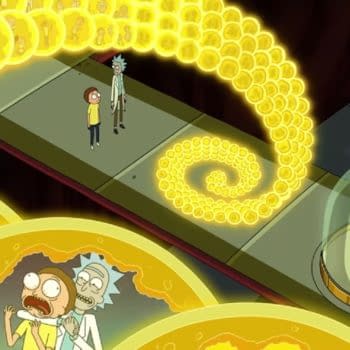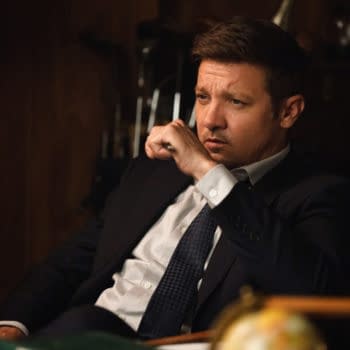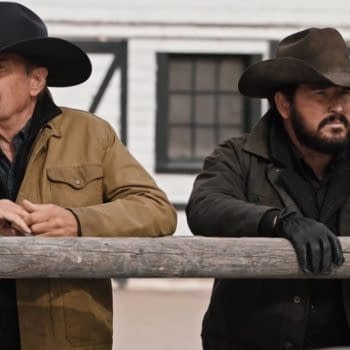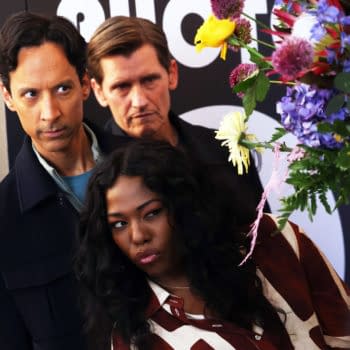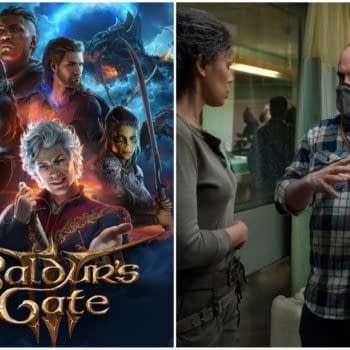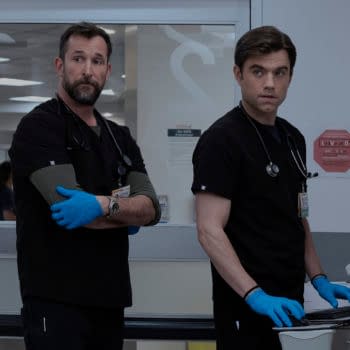Posted in: BBC, Doctor Who, TV | Tagged: 12th doctor, bbc, bleeding cool, cable, capaldi, capladi, david tennant, doctor who, Gallifrey, matt smith, peter capaldi, streaming, television, The Twelth Doctor, Time Lords, tv
Doctor Who: In Praise of Peter Capaldi- The Meta Doctor We Needed
Peter Capaldi doesn't get enough respect. In the modern incarnation of The Doctor, there's a definite fan consensus around the love for David Tennant and Matt Smith, with Jodie Whittaker gaining a larger and growing fanbase. And Christopher Eccleston has his fans, too– he was, after all, the first in this reboot. Don't get me wrong: I love all of them too. And in many ways arguing over who the "best" incarnation of this character would be a very strange concept for The Doctor themselves. And yet, we're fans, so here we are.
And after passing a recent 6th anniversary of the premiere of Capaldi as The Doctor in the episode "Deep Breath," it seems time to give him his propers as one of our finest Doctors. The backlash against Capaldi was immediate. He wasn't as cute or fun as Matt Smith. He had, as he admitted in the show, "angry eyebrows." But his face (that face!!) was the key to some of the most important Doctor Who mysteries of the time and has huge emotional resonance for the character.
Why Did the Twelfth Doctor Choose That Face?
This is, of course, the question at the heart of understanding why the Twelfth Doctor was so important. In that first, fateful episode, he looks in a mirror and wondered:
Look, it's covered in lines. But I didn't do the frowning. Who frowned me this face? Do you ever look in the mirror and think I've seen that face before?… Why this one? Why did I choose this face? It's like I'm trying to tell myself something. Like I'm trying to make a point. But what is so important that I can't just tell myself what I'm thinking?
Fans started putting together theories almost immediately, as Peter Capaldi had appeared both earlier in the Doctor Who episode "The Fires of Pompeii" and also on the Torchwood miniseries "Children of Earth." How were these things related?
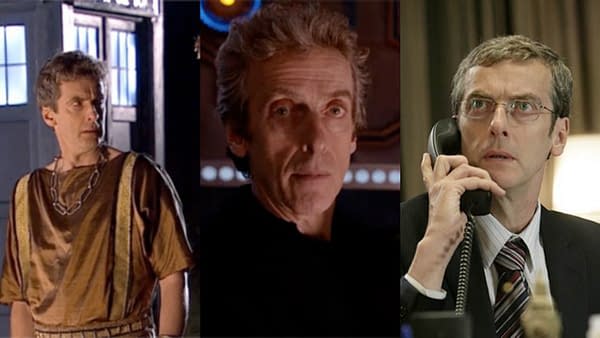
In the episode "The Girl Who Died" he comes to an important realization, remembering his past life as the Tenth Doctor and saving Caecelius from Pompeii despite it being a fixed point in time.
My face. Who frowned me this face? Why this one? Why did I choose this face? I think I know why I chose it. I know where I got this face, and I know what it's for. To remind me. To hold me to the mark. "I'm the Doctor, and I save people."
He then, of course, saves Ashildr (Maisie Williams) and her immortality that he bequeaths then has its own set of unintended consequences. (Speaking of, I'm still waiting for my spin-off series starring Williams and Jenna Coleman as they take "the long way 'round" traveling around the galaxy in a rogue TARDIS. Make it happen, BBC!)
In another piece of melancholy fatalism, Russell T. Davies and Steven Moffat later revealed that John Frobisher in Torchwood was a descendant of Caecilius and that his death and the death of his family was "time pushing back" and bringing an end to their bloodline after they'd been saved from Pompeii. That's depressing. However, this brings a special poignancy to what The Twelfth Doctor views as their core identity: I'm the Doctor, and I save people.
Am I a Good Man?
In one of the other first episodes where the Twelfth Doctor first appears, "Into the Dalek," he asks Clara a simple, and yet very complicated question: "Am I a good man?" The episode itself offers no satisfying answer, although Rusty the malfunctioning Dalek does say "You are a good Dalek." Yikes. Given that they are a race of genocidal beings of pure hate, that might not be what we're looking for. But Clara did offer "You asked me if you were a good man. And the answer is, I don't know. But I think you try to be. And I think that's probably the point."
Later on, in the episode "Death in Heaven," the Twelfth Doctor finally answers his own question:
I am not a good man! And I'm not a bad man either. I'm not a hero. I'm definitely not a president, and no, I'm not an officer. You know who I am? I am an idiot! With a box and a screwdriver. Passing through. Helping out. Learning.
What was ultimately refreshing about the Twelfth Doctor was that he was introspective on a completely meta level. Eccleston, Tennant, and Smith all brought a certain sadness and self-doubt to what they were doing, but it was Capaldi who brought it home on a cosmic scale. Is this thing that they're doing worth the sacrifice, worth the heartache? And are they a good person for doing this?
And that makes all the difference.
Deep Episodes
There are certainly some clunkers in Series eight through ten, but I will put Series 9 up against any season of any science fiction television show for its consistent quality. From the moment the Twelfth Doctor entered the episode playing an electric guitar on the top of a tank, it was clear that we were shaking to the foundation exactly who The Doctor was.
Many of the episodes ended up being two-parters, and some of that spaciousness allowed for much longer, more involved storytelling. As mentioned above, "The Girl Who Died" got a stunning counterpoint in "The Woman Who Lived." The opening two episodes tell a long story about Davros, the creator of the Daleks. And then there's "The Zygon Invasion" and "The Zygon Inversion" which is not only a beautiful Doctor Who story, but with its setting in Truth or Consequences, New Mexico very clearly is about the political issues around immigration. And in the same way Shakespeare set so many of his plays in Italy in order to soften the political satire, making it more palatable to a home audience, this shows the full brilliance of these episodes which aired in the midst of the Brexit debate.
And for a show centered around time travel, it's so rare that the show would actually ever deal with time travel as an issue. Enter "Before the Flood" and the introduction of the Bootstrap Paradox.
Who wrote Beethoven's 5th?
And then "Face the Raven"/"Heaven Sent"/"Hell Bent" provide the greatest arc of any episodes of Doctor Who ever. Again, playing with the idea of time, causality, time loops, tenacity make "Heaven Sent" so beautiful, so tragic, and so amazing. It is, perhaps second only to "Blink," the greatest episode of Doctor Who of the new reboot.
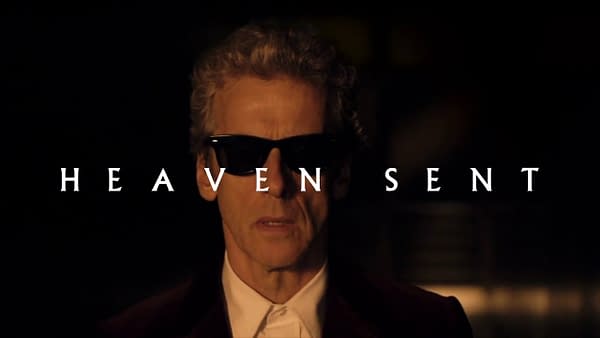
All of these episodes make it so incredibly fun to watch the Twelfth Doctor as he muddles his way through things. Because of how smart and how much heart these episodes are, we can't sleep on the mastery that is Peter Capaldi as The Doctor.




